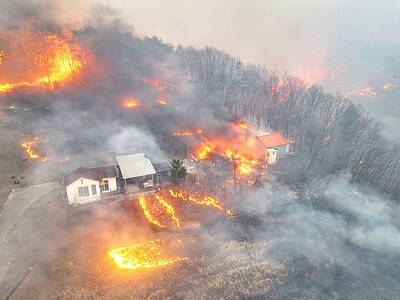Beaming with pride as she stirs a steaming pot of spinach and nuts, Maria Douca is one of the first in Mozambique’s capital to own an ethanol-fired stove, burning fuel made from locally grown cassava.
Betting that thousands of other city-dwellers will also switch from their charcoal stoves, a multi-national consortium plans to generate carbon credits to sell to greenhouse gas emitters on the other side of the planet.
Under the Cleanstar scheme led by Danish biotech giant Novozymes, Mozambican farmers sell surplus cassava that is converted to ethanol at a new facility near the central port city of Beira.
The fuel is then shipped to Maputo, where Cleanstar sells the stoves. They say they cannot keep up with demand. About 200 stoves were sold in the first month and another 3,000 are on order.
Douca has already bought two stoves despite the US$25 price tag — easily a week’s income for her family of eight.
Simple, clean and compact, the appliance designed by Swedish company Dometic looks rather like a camping stove, but does not produce smoke. For the first time in her life she can cook inside.
“I had problems with my eyes when I was cooking on the ground. My eyes ran, I had asthma problems,” she said.
About 85 percent of Mozambique’s energy comes from wood and charcoal. It is a leading cause of respiratory illness, and studies have shown that primitive cooking stoves kill more people per year — about 2 million — than malaria.
Cleanstar hopes to capture a sizable chunk of Maputo’s US$153 million a year charcoal business. Ethanol sells at roughly the same price as charcoal — which has doubled in the past three years.
Bank of America Merill Lynch has put US$4 million into the project, which will generate carbon credits, based on the reduction in carbon dioxide emissions.
The credits can be sold to polluters under trading schemes in places such as the EU or Australia.
“I have seen a dozen different cook stove projects that economically haven’t made sense. This is the first one I’ve seen that is completely integrated,” Bank of America Merill Lynch carbon markets portfolio director Abyd Karmali said. “From an environmental standpoint, it is delivering a very large greenhouse gas emission reduction.”
A move by the EU to accept new carbon credits only from the world’s poorest countries after this year has made countries like Mozambique more attractive to investors.
If successful, its investors believe the Cleanstar model could be replicated across the region.
“The reason this is interesting is the potential to replicate it not only once, but 10,000 times across Africa,” Novozymes president Steen Riisgaard said.
“Every single link in the value chain should make good money for themselves or the whole thing will fall apart. Also a little money for us selling enzymes,” he added.
The company’s enzymes help convert cassava chips into ethanol fuel at the Beira plant, the first of several planned facilities.
Initially hesitant to support the sale of cassava — a basic food for many — Mozambique’s government now embraces the project.
“There is no contradiction between producing for food and producing for agro-industry. Our country is vast,” Mozambique Agriculture Minister Jose Pacheco said.
Despite its fertile soils and favorable climate, Mozambique uses less than one-tenth of its arable land — the lowest land use in southern Africa.
Farming occupies 80 percent of the workforce, most cultivating just 1 hectare. Few farmers have access to seeds, fertilizers or modern equipment. Malnutrition is rife and the country is a net importer of staple foods.
On the face of it, everyone is a winner — the makers of the stoves and the ethanol, the family that uses the new gadget and the climate itself.

DEATH CONSTANTLY LOOMING: Decades of detention took a major toll on Iwao Hakamada’s mental health, his lawyers describing him as ‘living in a world of fantasy’ A Japanese man wrongly convicted of murder who was the world’s longest-serving death row inmate has been awarded US$1.44 million in compensation, an official said yesterday. The payout represents ¥12,500 (US$83) for each day of the more than four decades that Iwao Hakamada spent in detention, most of it on death row when each day could have been his last. It is a record for compensation of this kind, Japanese media said. The former boxer, now 89, was exonerated last year of a 1966 quadruple murder after a tireless campaign by his sister and others. The case sparked scrutiny of the justice system in

The head of Shin Bet, Israel’s domestic intelligence agency, was sacked yesterday, days after Israeli Prime Minister Benjamin Netanyahu said he no longer trusts him, and fallout from a report on the Oct. 7, 2023, Hamas attack. “The Government unanimously approved Prime Minister Benjamin Netanyahu’s proposal to end ISA Director Ronen Bar’s term of office,” a statement said. He is to leave his post when his successor is appointed by April 10 at the latest, the statement said. Netanyahu on Sunday cited an “ongoing lack of trust” as the reason for moving to dismiss Bar, who joined the agency in 1993. Bar, meant to

DITCH TACTICS: Kenyan officers were on their way to rescue Haitian police stuck in a ditch suspected to have been deliberately dug by Haitian gang members A Kenyan policeman deployed in Haiti has gone missing after violent gangs attacked a group of officers on a rescue mission, a UN-backed multinational security mission said in a statement yesterday. The Kenyan officers on Tuesday were on their way to rescue Haitian police stuck in a ditch “suspected to have been deliberately dug by gangs,” the statement said, adding that “specialized teams have been deployed” to search for the missing officer. Local media outlets in Haiti reported that the officer had been killed and videos of a lifeless man clothed in Kenyan uniform were shared on social media. Gang violence has left

‘HUMAN NEGLIGENCE’: The fire is believed to have been caused by someone who was visiting an ancestral grave and accidentally started the blaze, the acting president said Deadly wildfires in South Korea worsened overnight, officials said yesterday, as dry, windy weather hampered efforts to contain one of the nation’s worst-ever fire outbreaks. More than a dozen different blazes broke out over the weekend, with Acting South Korean Interior and Safety Minister Ko Ki-dong reporting thousands of hectares burned and four people killed. “The wildfires have so far affected about 14,694 hectares, with damage continuing to grow,” Ko said. The extent of damage would make the fires collectively the third-largest in South Korea’s history. The largest was an April 2000 blaze that scorched 23,913 hectares across the east coast. More than 3,000